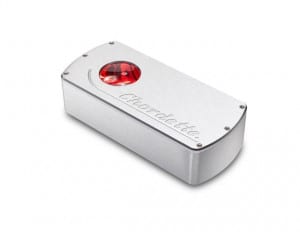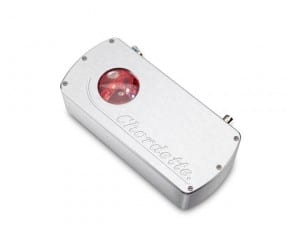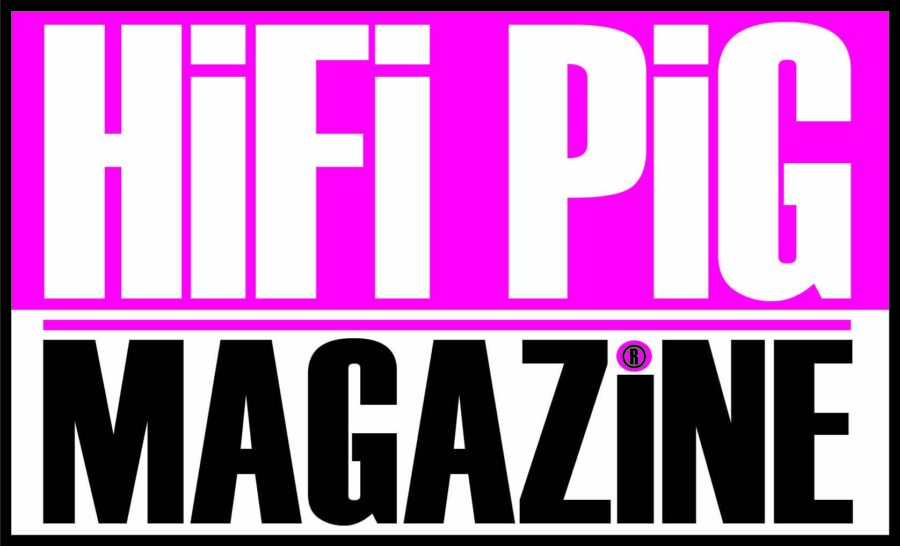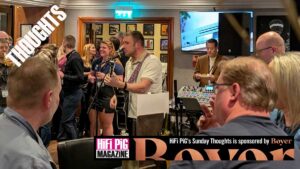Chord Electronics – Qute EX DAC
Needing no introduction the hugely well known and popular Chord Electronics provided Hifi Pig with their ultra  compact and aptly named Qute EX DAC (£1195) for review.
compact and aptly named Qute EX DAC (£1195) for review.
The diminutive Qute EX is capable of playing DSD files up to 128 decoding levels and PCM from 44.1 to 384khz 16-32 bit. It has USB, optical, coaxial via BNC and an input for the wall wart based power supply, whilst the simple milled and anodised aluminium casework is completed with a magnified fish bowl type circular window giving a visual indication to power and lock LEDs mounted on the circuit board.
Burning In
Burning in with the EX is essential so give it at least 150 hours to tone down the sharpness of the extremely detail driven presentation in order to round the edges a little and calm the higher frequencies. Bass will fill out in the lowest frequencies and upper bass becomes more tuneful too.
The Sound
On first listen the tiny Qute EX has an absolutely huge, robust and dominating sound that is in extreme contrast to my Totaldac. It is very clean and tempered displaying an extremely wide bandwidth. It sounds peakier than I am used to, but has a real talent for exposing detail… and I mean every detail. Also, quite noticeably from the outset there is a large amount of gain meaning I could only turn my Emille amplifier up to around half of where I would normally to achieve similar listening levels.
Listening to vocal and acoustic music I would say that there is an emphasis on the recorded material that really stands out. I know a few guys who really enjoy delving into the mix of a recording and this type of sound would suit them perfectly but for me I felt that the DAC didn’t render the decay of the instruments with a flowing nature, but that it stops and starts on a dime displaying leading edges with absolute precision and timing. It’s fast, very dynamic, has a soundstage that can explore every reverb, performer and musician without breaking a sweat and all in a more upfront nature that offers the listener a semi near-field experience.
Playing some ‘Power Ballad’ type rock music I loved the grunty and raspy electric guitar that rang through the soundstage and I don’t think I’ve ever heard so much detail extracted from this type of music before. Every note, chord, string, cymbal, drum beat and vocal is absolutely right there to hear in all its glory – upfront, close and personal.
Bass notes were particularly good with the extension and size of the bass being accurate and it just rolls across the room effortlessly.
Some new age jazz shows terrific sound-staging and although forward as a whole the Qute EX still displays a very good amount of intelligent layering with dynamic flurries of instruments. Clarinet solos can become a little hard I thought and the Chord does favour very good recordings for sure. I’d listen to one piece of music and think wow this is awesome and then the next song would sound a bit grainy and peaky, so be very careful when feeding the Qute EX DAC with anything less than the best recording you can obtain – it lays them bare!
However, playing a great recording on the Chord has it expressing detail and flow in double bass and complex cymbal work with sax or trumpet that will utterly impress and astonish. For my personal taste there was an overall desire to critique each instrument and get so drawn into the recording that I found myself drifting away from listening to the music as a whole piece sometimes.
I’m giving with one hand and taking with the other here I know and my personal tastes are somewhat irrelevant here – it’s more about describing the overall sound of the DAC which I am trying to convey.
A simple piece of music such as ‘Blue Jeans Blues’ by ZZ Top – the acoustic version, sounds absolutely fantastic through the Chord. This is an uncluttered stripped down piece of music and the Chord allowed each instrument and the vocal to shine through incredibly well, rendering each individual portion of the record in a way the Totaldac just cannot. And then we have the flip side of the coin as on ‘Seven Wonders’ by Fleetwood Mac and it all gets a little much for me, I just don’t think my brain is capable of computing that much information in one go. In comparison the Totaldac doesn’t actually miss out on anything, but to me it comes across as a more relaxed presentation which for me makes for a less fatiguing listen.
Listening at lower volumes late at night is a bit of a treat using the Qute EX and being able to hear every single note and nuance without disturbing family or neighbours was really nice.
Higher resolution files fed from the Mac showed detail in even more abundance and great quality recordings really gave a huge wow factor with an extremely clean sound that I’d liken to the sound you may get whilst monitoring in a studio.
In Conclusion
The Qute EX is exactly that, it looks absolutely fantastic. Sound-wise it not within the boundaries of what I would consider to be perfect for me across the broad range of music I listen to day to day, but for the nearest of acoustical performances and late night listening I thoroughly enjoyed its hugely detailed and forward presentation.
The Qute EX really is massively detailed, clean and has an extreme bandwidth, with the sound being forward and upfront. Feeding it with great recordings is a must, partnering with good quality electronics is a necessity and I would say it definitely bridges the gap between hifi and pro audio.
If this type of high-fidelity, recording laid bare presentation is the sound that you strive for (and I know many who do) then partnered with equally good equipment before and after the Chord is sure to impress the pants off you.
Would I recommend it, well I’m leaning towards no but then that would be a more personal take on the DAC and that’s not what a review like this is really about.
I was asked by a friend ‘but if someone you knew was after a DAC and enjoyed a more analytical, detailed and upfront sound and asked your opinion on what to buy, what would you suggest?’
The simple answer has to be without a doubt the Chord.
Author – Danny Worth
How we carry out reviews.
Read more Hifi Review.





























































